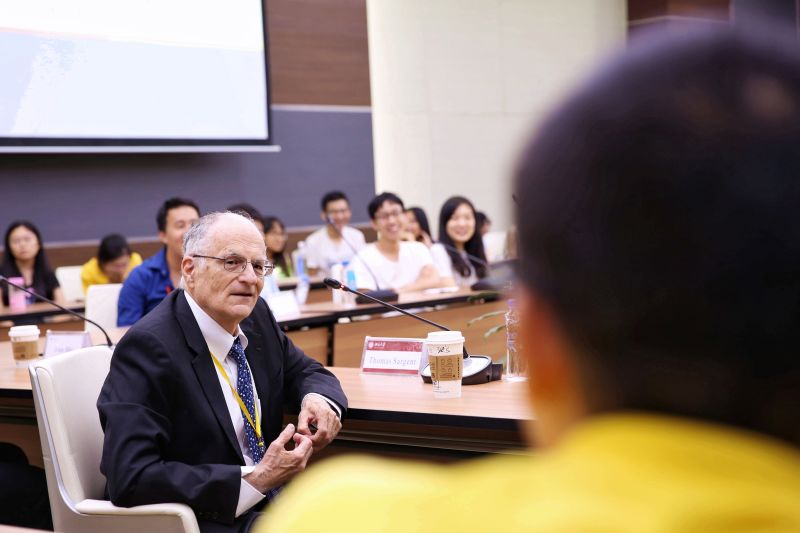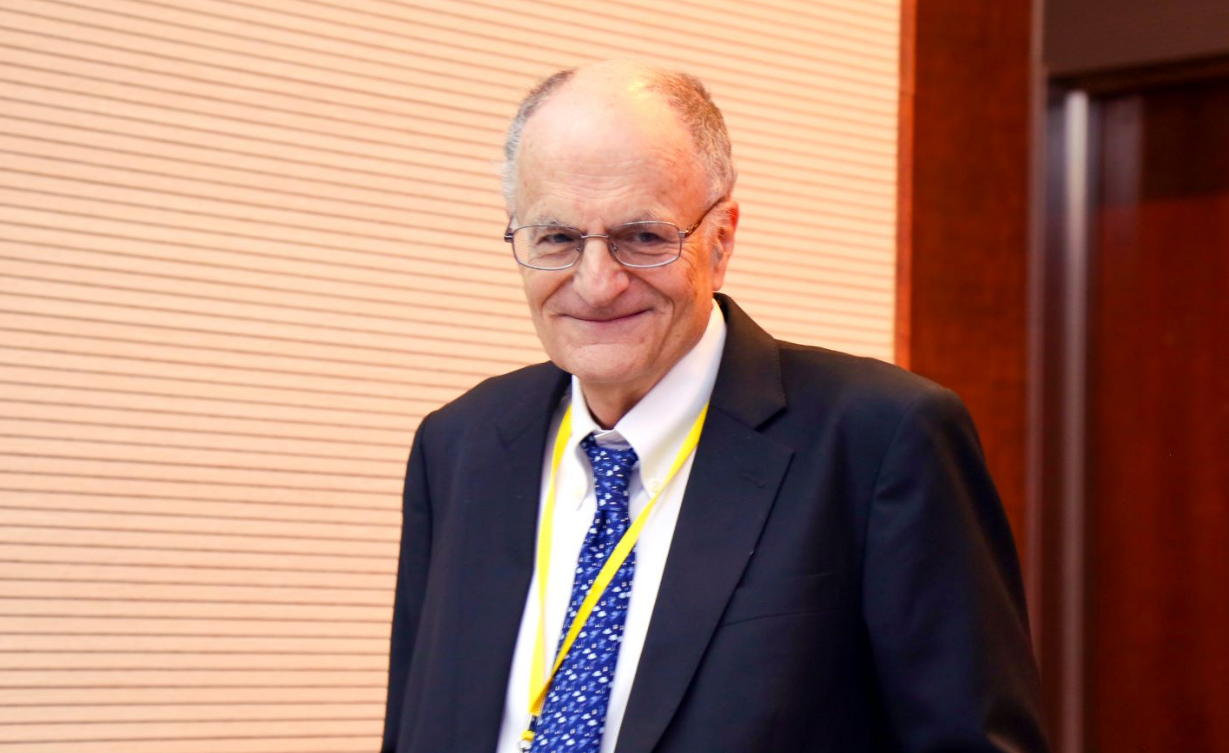By Annie Jin, PHBS Media and Public Relations Office
Nobel Laureate Sargent is taking questions from PHBS Students
“I love economics, and I love those models,” Thomas Sargent told a group of students from Peking University HSBC Business School (PHBS).The Nobel Laureate in economics seemed to enjoy the face-to-face dialogue and answered questions carefully with a low yet sometimes ragged voice, strained after a morning of attending forums and presenting the keynote speech.
Actually, Sargent is notable for making short speeches. For example, in 2007 his Berkeley graduation speech consisted of 335 words. However, when it comes to dialogues with students, the economist in his seventies can talk non-stop for hours. He changed the formality demonstrated in the morning keynote speech to a casual style, using some jokes and hand gestures to elaborate on his views or indicate a topic change. “I prefer to talk with students,” Sargent said. “They often raise interesting questions.”
Sargent was awarded the Nobel Prize in Economics in 2011 along with Christopher Sims “for their empirical research on cause and effect in macroeconomics.” At the awards ceremony, Sargent delivered a speech for students at Princeton University Hall and reminded them to “tap their potential.” A devoted teacher, Sargent is well known for his reading group at Stanford and New York University (NYU), a school noted for its graduate program in economics.
“Young economists are pushing forward macroeconomics,” commented Sargent in response to accusations by his contemporaries about massive use of models, “The scholars my age are just horrified.” To provide some context, Sargent said that his pioneering expectations theory was once challenged by senior scholars. Yet, he then won his longstanding reputation for the theory and has ranked among the most cited economists in the world. So, unlike those who question “mathiness” in macroeconomics, he takes a more progressive view on young scholars’ efforts in model application.
Sargent’s philosophy is to “grow old gracefully.” He still teaches economics courses at NYU, is devoted to research and exploring economics models, and works out regularly to keep in shape. In an interview after the talk with PHBS students, Sargent shared his insights on expectations theory and economic models, as well as views on how to step out of the academic “ivory tower.”
Sargent attends 2016 Peking University Global Financial Forum and shares his insights about Financial Integration.
Q: As one of the leaders of the " rational expectations theory," you once used a Chinese saying, “The government has strategies; the people have counter-strategies,” to describe this theory. Why do you use this description? What’s the real cause-effect relationship between policymaking and people’s expectations?
Sargent: It’s mutual, which is true in any game or human relationship. For example, you have a strategy or a rule that tells what you should do and what the situation is. And then the point of the rational expectation or the ancient Chinese proverb is that my counter-strategy depends on your strategy. If I start a business and the government tells me it will take 10% of the business revenue in taxes, I will do something else. Policy-making has real impacts on our expectations, and policymakers know that, so smart policymakers will take the possible impact into account.
No matter whether the game theory is applied to finance or economics, our models are about people. People inside the model are making decisions concerning the variables that the model includes, so they need theories on the consequences of their decisions. There are too many models out there. It’s like a Russian doll where there is a model inside a model. Rational expectation is like communism: people inside the model share the model together and they have the same possibility distribution that the whole model produces. That is a powerful framework that rules out systematic differences.
Q: You have employed computer models to conduct large-scale economic experiments to explain the role of expectations. Could you share some insights on how to build models to evaluate abstract concepts like expectation?
Sargent: We actually got this problem from Paul Krugman. If you look at Europe and the U.S. from the late 1970s on, most European countries had systematically higher unemployment than the U.S. Why? Some people may automatically think it is because Europe has very generous unemployment compensation and a very high safety net. If a person becomes unemployed, he or she is entitled to state support. Krugman said it couldn’t be right that the higher unemployment was due to government subsidies, because government had subsidized unemployment since World War II. If you go back to look at the unemployment rate in the 1950s and 1960s, European unemployment was constantly lower than the U.S. So, Krugman argued that it could not be the social safety net alone, there had been something else.
My friend Robert Lucas and I built a computer model concerning expectation. Except for government policies, Europe’s economic environment was the same as the U.S. at that time. So, we rebuilt the model in which there was more generous compensation and more job protection and also used a search model where unemployed workers searched for jobs. When the worker was unemployed, his or her human capital went down, and vice versa. Periodic unemployment changes depend on how workers search and react. For instance, the worker could get an offer with a certain wage, but it’s random whether or not he or she will take the job. In addition to these opportunities, the unemployed in Europe can get high employment compensation for a long time. However, those who become unemployed in the U.S. can only get stingy compensation that runs out after six months. Workers can take that into account: how about staying unemployed for four months and working two months to ensure the compensation? You may say it’s too complicated for people to do so, but my neighbor who didn’t go to college knows this calculation.
While the institutional differences remained the same over this time period, the microeconomic environment for workers changed, with a higher risk of human capital depreciation in the 1980s due to globalization. So, as we went through the micro data, we found that the volatility of individual earnings and wages became greater, rather strikingly, under the influence of technical changes and international competition. In the original model, you might get a phone call to inform you that you got fired. Despite the job loss, you still have high human capital you built from being employed. As globalization has come about, a two-phone-call model should be applied. You might get the first phone call to inform you that you got fired, and then get a second call to say that your human capital gets reduced. In Europe, compensation is related to the unemployed person’s last earnings, which rely on the high human capital the person accumulated before. So, as human capital drops, the unemployed will be pretty picky in finding a new job. Our rational expectation model calculated the data and revealed that a certain fraction of the labor force (mainly older workers) were bailed out by the European governments and became the permanent long-term unemployed. However, U.S. agencies were doing the opposite against people’s expectations.
Q: After the 2008 financial crisis, modern macro has been widely attacked as deficient and wrongheaded, while microeconomics seems to get an upper hand. And models, such as DSGE (Dynamic Stochastic General Equilibrium) and RBC (Real Business Circle), have been questioned in Paul Romer’s article “Trouble with Macroeconomics.” What do you think about these accusations about modern macro and models?
Sargent: Paul is a friend of mine, but like me, he is getting old. Here’s a phrase, “Everyone has the right to grow old bitterly.” Young people have a huge advantage in macroeconomics or microeconomics, because economics requires computer skills and advanced mathematical skills. Young macroeconomists have been doing things that are, in terms of ambition, far beyond what people were doing in our time. A number of people at my age are horrified because they cannot do it anymore. Like old basketball players, they cannot jump anymore. Paul hasn’t been doing academics for years, and he is getting “out of shape.” So, he has made a mistake by criticizing things he hasn’t read through thoroughly. A lot of people hate mathematics or economics because it’s so damn tough that few people can even understand and handle it. What these talented young economists have been doing are actually pushing forward math and data analysis in really incredible ways. Articles Paul Romer has read include models that, though not perfect, can tell what is going on in modern economics.
Those young economists are like us in our prime days.When rational expectation first emerged in the 1970s, the old guys who were at my current age said that it was the most stupid concept they ever heard. How could it ever be possible to include people in a psychological model? People are too stupid and irrational!Milton Friedman once said, “In a given situation, there is one way to be rational, but there is an infinite number of ways to be irrational.” However, it has been proved that their views were very elitist and arrogant. So, it is like the old days all over again.
Why do people like to set up macroeconomics versus microeconomics? Nowadays, the difference between the two is vanishing, and macroeconomics also uses micro tools to study macro issues. A big part of fixing the macroeconomic issues in the U.S., Europe and China now involves structural reforms, which are micro policies that make labor and financial markets move more smoothly. People can choose to grow old bitterly or gracefully. I am lucky to study a really beautiful subject, which is about people but involves a little bit of mathematics. For me, good economic models are beautiful with perfect frameworks, which I can enjoy every day when I am old.
Q: Compared to building models, some scholars or students tend to be in favour of something called economic instinct or common sense, which may be regarded as a more direct and simple tool to explain complicated phenomena than complex mathematics. What do you think about the importance of common sense?
Sargent: I think common sense is something that people are born with, something that is hard to teach. I have two friends. One is very brilliant academically but has no common sense, but he can solve any physics or calculate problems very fast. The other one has lots of economic common sense but struggles to solve math problems. Common sense is like a gift, which is hard to describe but can be recognized. The beauty of economics is the art of assumptions. Though it is impossible to assume that all people have certain common sense and therefore will get certain expectations, we can make an overall assumption about people’s behavior. Great economists can make assumptions that are not always right, but capture something essential. The way they describe assumptions and theories is a gift that cannot be taught and requires common sense and mathematics. So, I do not think common sense can be taught, but it is important.
Q: Your research makes it possible to assess the effects of unexpected policy measures and systematic policy shifts. Could you share some experience about how to make economic research step out of the “academic ivory tower” to impact the real world and policymaking?
Sargent: I mentioned the third plenary session of the 18th Communist Party of China Central Committee earlier today. The three pillars policy discussed in the third plenary was very carefully thought out, representing the best macro-economic research in centuries. I think economic theories and research nowadays has a huge impact on policymaking in China. In today’s conference, the two speakers from China were using models and theories at a high level to discuss policies. One of the speakers is connected to the government. So, looking at things that government produces, I have reason to believe that the economists in China have the ear of the government.
Q: A recent article by Chen Zhiwu, professor at Yale School of Management, argues that some of the U.S. key universities tend to reduce the number of doctoral admission for Chinese candidates because most of them lack clear goals, true interest and creativity when doing research. What do you think about this trend? What matters most in academic research and economic education?
Sargent: I don’t know about this trend, and I’m rather surprised. Most of my best students are Chinese, as well as the best of my former students, and they demonstrate solid mathematic skills, passionate research interest and good creativity. Their education in China is really good, and they are very talented and honest. I have students who achieve things I never thought were possible and created things I cannot create by myself. I do not think this trend is true, and no university that I am familiar with has such a trend or bias.
















